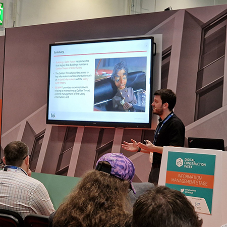Construction requires safety, experience, and hands-on training most of which is taught on-site rather than through traditional classroom settings. This requires companies to lease heavy machinery and equipment for perhaps longer per project so their new staff can safely practice and operate them before and after the project is complete.
Training safety can be strenuous as teaching beginners is a day-by-day experience in which they have to watch and observe in real-time for safety instructions or hazards. Moreover, companies must provide resources in training such as an experienced veteran who will have to take time out of their day and work to hand over these valuable lessons.
This can put a pause or even halt completion times if the training isn’t done under perfect conditions. Training could also be sporadic due to limited resource.
For instance, what happens when training on heavy machinery just isn’t available for part of the year? Or, if there aren’t enough workers to train beginners on a daily basis? It’s important to introduce this knowledge needed to boost a sector which is facing a shortage of both workers and skills.
According to an article Barbour Product Search has previously published regarding skill shortages, “As of 2018, around 16,280 construction companies’ staff don’t harness the skills they need, highlighting the severity of the shortage.” A skill shortage and worker shortage means companies may need to adapt to new learning environments.
Teaching Them Young
In the next 15 years, 750,000 construction workers are set to retire. An ageing workforce will ultimately deepen the skills shortage. Research shows that only 20% of construction workers are under the age of 30 and there seems to be a real lack of enthusiasm to join the sector after graduating. This could be due to the outdated view that construction is seen as a last resort for people who don’t want to pursue higher education, or that there isn’t room for advancement within the sector.
Some schools and societies are taking notice of these facts and are implementing a type of simulation game to prepare future construction workers, architects, and engineers.
The Dr. Archie L. Blanson Career and Technical Education High School located in Houston, Texas is a modern facility school which offers 17 different career and technical education programs. Among their goals, says Principal Ben Ibarra is, “To train future workers who will close the skills gap in the industry.”
As the school doesn’t have access to heavy and large machinery to provide hands-on-training, they installed Vortex simulators by CM Labs and incorporated them into their curriculum. The software they chose included excavator training where students complete modules and practice operating. As their skills increase, so does the expectation of running the excavator smoothly and safely.
On top of operating training, the Vortex simulator emphasizes safety, a life-saving skill that can be done safely inside a simulation and where the risks can be assessed without real-life danger.
CM Labs have a wide range of construction training simulators in which users can practice using heavy machinery from the safety of their office or classroom.
GSE Solutions, another company which offers training simulators, offer programs like:
• Upgrades & Maintenance Simulators which focus on regulations and updating operating systems
• Platforms & Tools Simulators where engineers can focus on making the most accurate modelling technologies
• New Build Simulators which offer scenarios of real events and operating conditions
Benefits of Training Simulators
Case studies have reported a 40-70% faster rate in training when using training simulators.
Efficiency isn’t the only benefit to this technological advancement.
On-site training can mean higher equipment costs, more time spent out in the field, higher safety risks, injury compensation rates, and more. Using video games, known as simulators, can effectively eliminate these risks and bring a more accessible approach to new and current workers.
Gearing up for the new wave of industry professionals means implementing technology that the upcoming generation is comfortable with and has trained with before. Training simulators could be the future in upskilling and training.
CPDs
Upskilling and continuing development is ever important in the construction industry.
Be sure to browse Barbour Product Search’s selection of CPDs where you will find the latest CPD courses brought to you by the UK’s leading product manufacturers.















